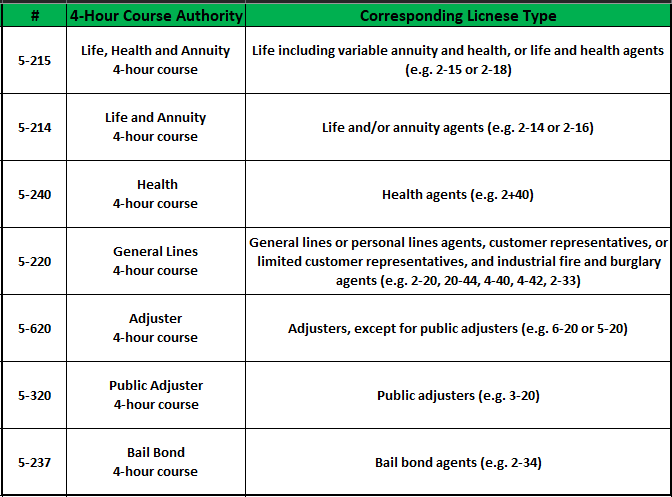Does Continuing Education Need a School License
Q. Who is responsible for selecting the appropriate course?
A. Ultimately that responsibility falls on the licensee. Licensees may ask providers for guidance in selecting a course; however, they must monitor their CE completion records to know exactly what type of course and how many hours are needed to meet their requirements. This can be easily done through your MyProfile account.
Q. Who is responsible to catch a duplicate course?
A. Licensees are responsible to verify a course is not a duplicate; however, providers are encouraged to inform a registrant if they are signing up for a duplicate course. Reasons why a licensee may not be aware a course is a duplicate include (but are not limited to) the following:
The title changed for an approved course.
Course changed ownership to a new provider.
Course was subcontracted to a new provider.
Q. Who is responsible for attendance records?
A. The provider is responsible for accurate attendance records and maintenance. The licensee is responsible for bringing proper identification to verify attendance and provide all necessary information.
Q. Who is responsible for reporting completion of CE courses to the Department?
A. Providers have 21 days to report completion of CE courses to the Department. Licensees should not submit certificates of completion unless specifically requested by the Department.
Q. Who is responsible for maintaining documentation of completed CE courses?
A. Both the course provider and class participants are required to maintain records. Providers must maintain attendance records for a period of five years. These records must be available in the event of an audit or discrepancy in CE records. Licensees are responsible for maintaining a copy of their certificate of completion if ever requested by the Department for verification purposes.
Q. Who is responsible for reporting violations of Florida Statutes or the Florida Administrative Code during CE courses?
A. Both course providers and licensees are responsible for reporting any conduct that would be considered a violation of the statutes or Department administrative rules.
The Florida's non-resident all-lines adjuster reciprocity list can be located here. This list doesnot pertain to the non-resident all-lines public adjuster license and the non-resident designated home state (DHS) adjuster license. The list is separated into two categories: license examination exemptions and continuing education reciprocity.
Examination Exemption
Individuals seeking licensure as non-resident all-lines adjusters in Florida may not be required to take and pass Florida's licensing examination. If you are applying for a non-resident all-lines adjuster license in Florida and you've passed an equivalent adjuster examination in one of the states marked "YES", you are not required to take Florida's non-resident all-lines adjuster licensing examination. The list is also applicable to adjusters "transferring" his/her resident adjuster license to Florida.
This list does not apply to individuals applying for the non-resident designated home state (DHS) adjuster license.
Continuing Education Reciprocity
If you hold a non-resident all-lines adjuster license in Florida, you are not required to complete Florida continuing education (CE) as long as you've completed a CE requirement in one of the states marked "YES" in the "Continuing Education Reciprocity" column. If you haven't completed a CE requirement in one of these states, you are required to complete Florida's CE requirement.
Our system periodically checks the National Insurance Producers Registry (NIPR) database to see if your non-Florida adjuster license(s) is in good standing. No action is required on your part unless we send you an email regarding your Florida CE status.
This list does not apply to individuals holding the non-resident designated home state (DHS) adjuster license. All individuals holding a Florida DHS adjuster licensemust complete Florida's CE requirements.
Reminder of Florida's 4-Hour CE Update Course Requirement
The enforcement of the required 4-hour update course will begin for continuing education compliance cycles ending January 31, 2022 and later. There are already approved courses to meet this requirement currently available. That number will continue to increase in the future.
Each licensee must complete a 4-hour course specific to their license type. When two or more licenses are held, the licensee must complete a 4-hour course specific to at least one license type held. Below you will find a list of available course authorities for the 4-hour course and how the requirement corresponds to each license type.

Applicable compliance cycles are reflecting the 5-hour course requirement in each licensee's MyProfile account.
Enforcement of the 4 Hour Update requirement will begin for CE cycles that end on or after 1/31/2022. If a licensee has an outstanding CE cycle that was due before 1/31/2022, that licensee should complete a previously approved 5 Hour Update course. These courses can be found via our course search function on our website.
NOTE: Non-resident agents and adjusters of Florida who are licensed and complete continuing education requirements in a state reciprocal with Florida will not be required to complete a 4-hour course.
For questions pertaining to Florida CE requirements, please email Education@MyFloridaCFO.com.
Source: https://www.myfloridacfo.com/division/agents/licensing/agents-and-adjusters/continuing-education
0 Response to "Does Continuing Education Need a School License"
Post a Comment